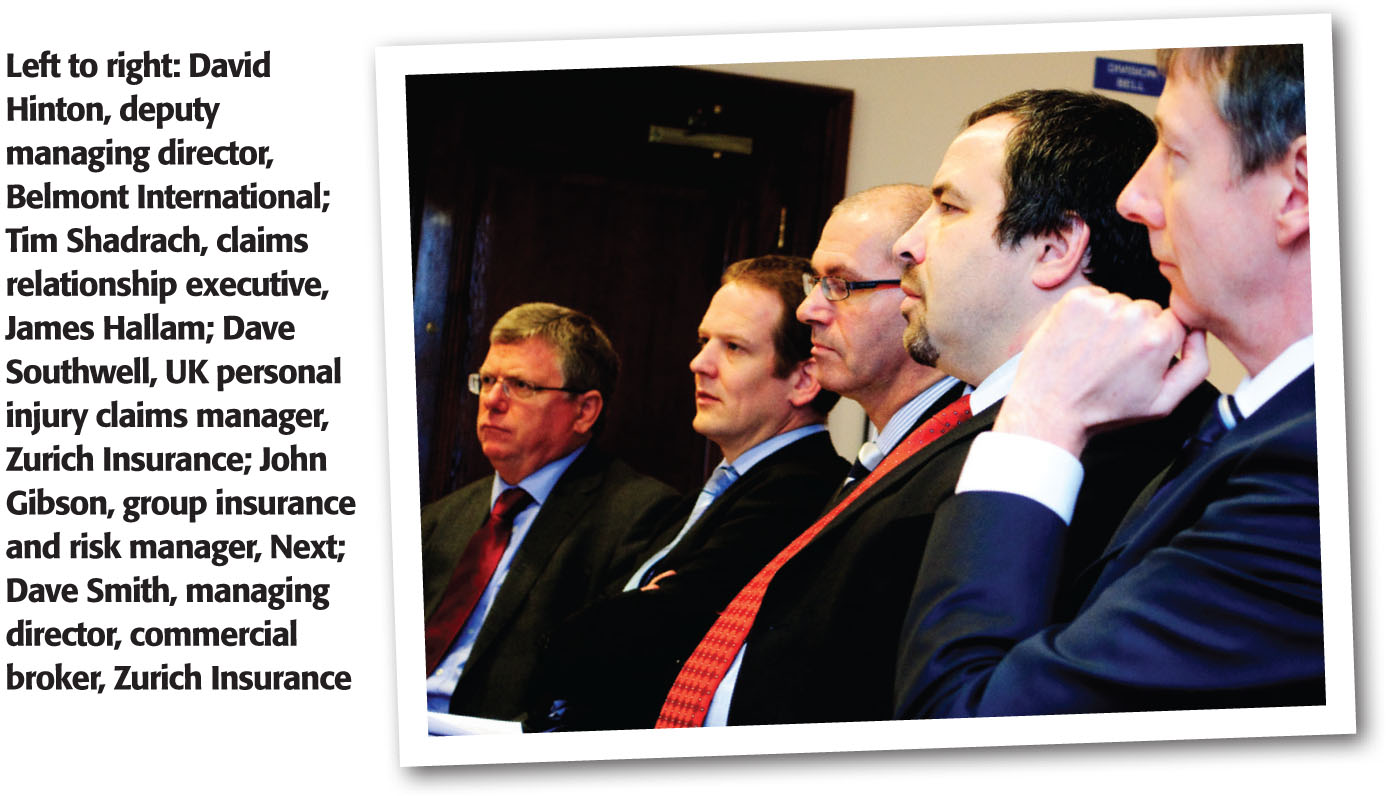
The Broker Business Club: Meeting of minds

Insurance Age has once again teamed up with Zurich Insurance to hold a series of Broker Business Clubs where some of the most influential insurers, brokers and stakeholders address and tackle the issues that matter to the modern insurance market. The first of these was held in London where delegates, under Chatham House rules, discussed the issues surrounding personal injury, the problems the industry faces, the potential solutions and how these solutions should be approached and managed.
What is the real problem in the personal injury landscape?
 It was widely agreed that the problem was a near-intractable one which did not offer itself to any quick fixes. As one representative from Zurich pointed out, “the personal lines injury landscape is not an insurance issue it’s a societal issue. We want to work towards something that is fair for genuine claimants and make sure the compensation is delivered swiftly.”
It was widely agreed that the problem was a near-intractable one which did not offer itself to any quick fixes. As one representative from Zurich pointed out, “the personal lines injury landscape is not an insurance issue it’s a societal issue. We want to work towards something that is fair for genuine claimants and make sure the compensation is delivered swiftly.”
However, as one individual pointed out, the biggest problem was that there were too many vested interests involved which meant that any progress was bound to be slow and painful and that, fundamentally, there was not a great deal of meeting of minds.
One of the main difficulties, despite the resurgence in interest in the personal injury problem from the political world, was that the insurance industry could be seen to be attempting to limit access to justice: “That is going to be one of the difficulties in terms of this personal injury debate. I think you are on sound territory when you contrast how much is paid out in damages against how much is paid out in legal charges. It’s very difficult to be anything other than a winner in that,” said one.
And as one broker commented: “At the moment, socially, there is an expectation that if someone hits you when you are in your car, you will get compensation.”

Is it fair to say the industry has fuelled the malaise around the personal injury environment?
It was accepted that the industry had certainly helped fuel the current problem. However, the conversation soon moved on to how the industry, while admitting its own shortcomings in this field, could begin to tackle the problem.
One of the Zurich representatives sanctioned the implementation of a fixed fee regime as it would “take the claims management companies out of the loop”.
It was suggested that the problem required parliamentary legislation to really tackle the issues around personal injury, which would necessarily take time but that a fixed fee regime could be implemented relatively quickly, while acknowledging that this would only be a start to the process.
And as one broker pointed out to general agreement: “We need to address the things we can control as an industry and there is a lot we can influence. There are ways of damaging the supply chain.”
One expert queried the government’s proposed ban on referral fees in personal injury claims arguing: “If they are a bad thing per se I wold have thought they would be banned full stop without qualification. Otherwise we are going to see displacement behaviour.”

Can the industry incentivise the quick notification of claims?
The table was unanimous that the industry was pretty much open to any solutions that would help tackle the problem and that incentivising claim notification could be one example of that.
As one participant said: “We are open to any innovation but there is no single solution. It’s all part and parcel of a solution to a system that is dysfunctional.”
One issue that raised concern regarding quick notification was the fact that RIDDOR (Reporting of Injuries, Diseases and Dangerous Occurrences Regulations) reporting is going to change from a three day absence to a seven day absence.
It was explained that the rationale behind the move was to free small business up from regulation but, as one broker pointed out: “It’s a frightening concept to increase that reporting time. The problem is that only 50% of RIDDOR is actually reported already and by increasing the time limit it might encourage an out of sight out of mind attitude and I think it’s going to create a big problem.”
If the Jackson proposals are implemented in full, how much impact will they have? Are they not just addressing the symptoms of a deeper problem?
As one of the Zurich representatives pointed out, one of the challenges of implementing Jackson as a package is that there are different mechanisms for bringing in different parts of the package.
“One of the concerns of the industry is the sequencing of implementation. For example, do we get fixed fees first or do we get the 10% increase in general damages? That hasn’t been bottomed out and that is a major concern. How that is handled will determine the outcomes,” he said.
Turning to the political aspects of the personal injury landscape, one delegate said: “One of the poorest things in this whole debate is the impact that our current system has in terms of behaviour. In public policy terms, it can’t be right to retain a system that encourages people to feel that if they don’t claim in an accident that they are missing out.”
One broker added that the problems surrounding fraudulent claims were exacerbated by the fact that the system does not actually bring any sanctions against those who act fraudulently.
Only users who have a paid subscription or are part of a corporate subscription are able to print or copy content.
To access these options, along with all other subscription benefits, please contact info@postonline.co.uk or view our subscription options here: https://subscriptions.postonline.co.uk/subscribe
You are currently unable to print this content. Please contact info@postonline.co.uk to find out more.
You are currently unable to copy this content. Please contact info@postonline.co.uk to find out more.
Copyright Infopro Digital Limited. All rights reserved.
As outlined in our terms and conditions, https://www.infopro-digital.com/terms-and-conditions/subscriptions/ (point 2.4), printing is limited to a single copy.
If you would like to purchase additional rights please email info@postonline.co.uk
Copyright Infopro Digital Limited. All rights reserved.
You may share this content using our article tools. As outlined in our terms and conditions, https://www.infopro-digital.com/terms-and-conditions/subscriptions/ (clause 2.4), an Authorised User may only make one copy of the materials for their own personal use. You must also comply with the restrictions in clause 2.5.
If you would like to purchase additional rights please email info@postonline.co.uk








